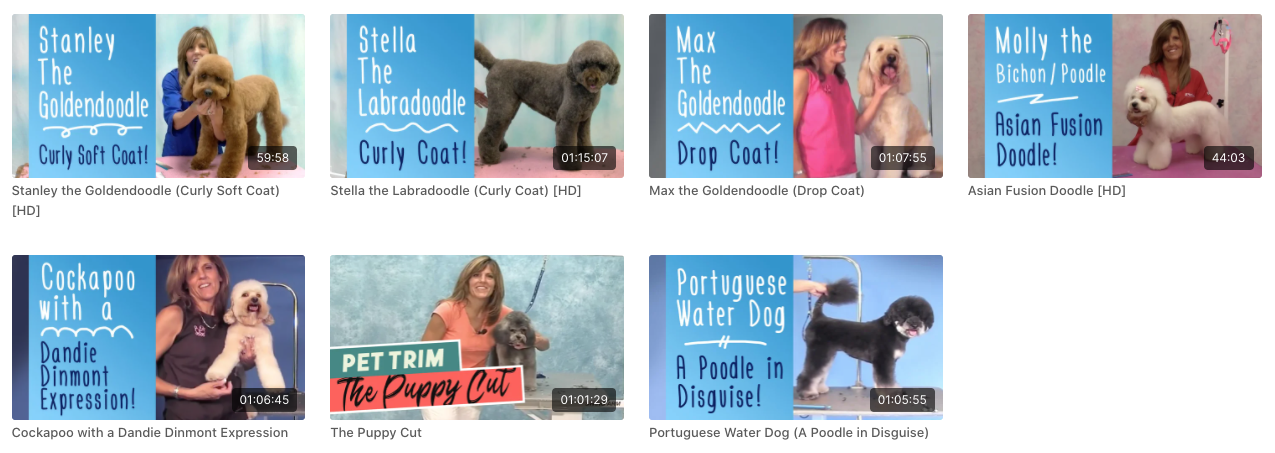With so many mixed breeds coming into grooming salons it can be difficult to decide how to groom them.
They all can look very different due to the differences in structure, coat type and texture.
However, all dogs have the same bone structure whether they are a purebred dog or a mixed breed. The bones are just different and size and density. For example; when comparing a Chihuahua to a Great Dane; same bones…different breed. When grooming any breed it is important to follow the dog’s body structure to show off parts of the dog which will in turn put style on the trims.
“A nice stylized trim should be well balanced.”
Balance is something that takes experience to develop an eye for. A dog that has a tighter body with fuller legs will appear more balanced than a dog with fuller body and short legs. When too much coat is left on the body two things can happen. First, the coat will mat. Second, the structure is not defined which will not show off the beauty of the dog. Structure meaning; the shoulder layback, spring of ribs, rear angulation and proper setting of the underline and tuck up.
mixed breed legs should also be styled to show the shape.
The front legs look nice when they are scissored in columns. By leaving more coat on the front of the leg will create that stovepipe appearance. The back of the leg and inside/outside of the leg can be set tighter. The front legs do not have to be the same length all around. The back of the front leg near the elbow area is where many dogs will mat. That is due to the fact that it is a friction area. The area where the elbow rubs against the chest when they walk/run. Setting the back of the front leg short will prevent matting.
The rear legs should be trimmed to show the bend of stifle and the rear angulation. When looking at the legs from the rear the legs should appear parallel to each other. Setting the rear angulation tight to the bend of leg will also prevent excess hair on the rear from matting. The inside and outside of the legs can be scissored shorter than the rest of the leg. When looking at the leg from the profile, the shape of the leg should be followed by showing the angulated rear, bend of stifle and hock.
When grooming mixed breeds, you’ll notice many have different tail styles. Some are docked and some are left natural. The tail can be groomed however the groomer feels will look nice on that particular tail length.
Heads can be the most difficult part of the trim for most groomers.
Many mixed breeds tend to mat very badly, especially on the cheeks and ears. Taking the cheeks shorter giving a more rectangular shape head will help prevent this matting. An Asian head style with shorter cheeks and a round muzzle will also work well. Short ears can be adorable on many breeds especially if they fall nicely and frame the face. Short ears can be shaved with 10, 7F or 5F and will look nice and clean and tidy. When shaving ears, the inside of the ears can be shaved with a 10 blade even when using a longer blade on the outside of the ear. This will really help the ears to sit and frame the face.
Turning a mixed breed dog into a purebred trim is also fun. If you can’t decide on a head style take a look at the dogs in Dog Grooming Simplified and transform your canvas! On page 459, Chapter “Mixing it Up”, you will see different mixed breeds and purebred dogs transformed into different breeds. This can be fun and helps you think outside the box.
The moral of this story is taking hair off in the right places and leaving hair in the right places will not only prevent matting but will also give a nice stylized balanced appearance.
Selecting the proper schedule for your mixed breed Doodle clients is imperative. I give my clients two choices if their dog comes back matted; either change the trim or change the schedule. Have fun with your Doodles!
Remember, the right hairstyle and schedule will keep them in good condition.
Watch Jodi Murphy groom Mixed Breed Doodles online
in addition to her 80+ educational videos available to stream now!






